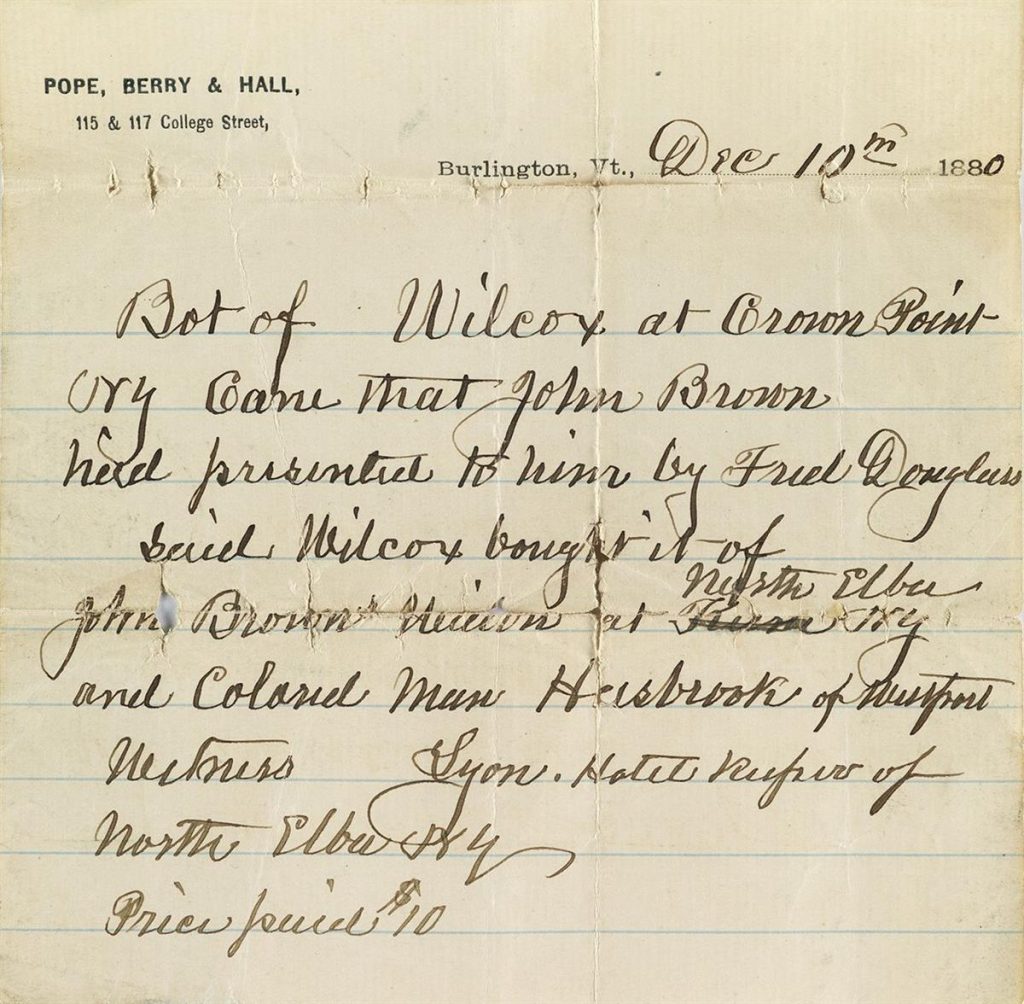
This walking stick carved with three alligators is being sold at Swann’s upcoming African Americana auction, along with a note stating that the cane was a gift from Frederick Douglass to John Brown, and tracing the provenance of the cane from Brown’s widow to the purchaser. After noting the well-documented history of Brown and Douglass’s interactions, Swann continues:
We have found no contemporary documentation that Frederick Douglass ever gave John Brown a cane or walking stick. Nor does the cane itself bear any inscriptions.
The entire burden of proof rests on a slip of notebook paper passed along with the cane for the past 140 years, on the letterhead of Pope, Berry & Hall of Burlington, VT, 10 December 1880: “Bot of Wilcox at Crown Point, NY, cane that John Brown had presented to him by Fred Douglass. Said Wilcox bought it of John Brown’s widow at North Elba, NY and colored man Hasbrook of Westport. Witness, Lyon, hotel keeper of North Elba, NY. Price paid $10.”

This story seems plausible. The gift from Frederick Douglass to John Brown would have likely been in the late 1850s. After Brown’s execution in 1859, the cane would have been left to his widow Mary Ann Day Brown (1817-1884) at her home in North Elba, NY. Probably shortly before she sold the North Elba property in 1863, it would have been given to Josiah Hasbrouck (circa 1818-1915), an African-American farmer who was a close friend and neighbor of the Brown family. Hasbrouck resided in Westport, NY from 1871 until before 1880 when he moved to Vermont. During this period he would have sold it to a man named Wilcox from Crown Point, NY; the only Wilcox there in the 1880 census was a 27-year-old laborer named John Wilcox. On 10 December 1880, it was sold by Wilcox to George F. Pope. It has been consigned by a Pope descendant.
It only gets better from here:
Any link in this chain could have been invented or exaggerated by any actor up through 1880. John Brown might have told his wife the cane was from Douglass, but it really wasn’t. Mary Brown might have told her friend Hasbrouck that it was John Brown’s cane, but it really wasn’t. Hasbrouck might have invented a Brown family provenance to effect a sale to Wilcox. Wilcox might have invented the whole story to effect a sale to Pope, although it seems unlikely he would have gotten so many details right. Less likely, George Pope could have invented the whole story and drew up this note to support it; or the original cane could have been swapped out at some point in the intervening century to pair with the note.
On the other hand, we have found no way to disprove the story, either. We are confident that the note is dated 1880, and we have found no reason to doubt the credibility of any of the parties. If this really was a gift from Frederick Douglass to John Brown, well, that would be quite a find.
Myself, I am glad to have found this auction, the contemplation of which, along with the contingencies and uncertainties of history, provides great pleasure. I haven’t had this much fun thinking about the way objects accrue an aura of significance since the slivers of Washington’s coffin and the random, stranded andiron with the attribution to Paul Revere.
07 May 2020, Lot 65: (SLAVERY AND ABOLITION.) Cane said to have been a gift from Frederick Douglass to John Brown. est. $4,000–6,000 [update: it sold for $5,720.] [swanngalleries.com]
Related? Mary Todd Lincoln gave her late husband’s favorite walking stick, TO Douglass, and another walking stick given to Douglass just sold for $37,500 in February and went to the South Carolina State Museum this week. OK, now something’s up. The Frederick Douglass Historic Site run by the National Park Service has a cane with an engraved silver band that reads, “FREDERICK DOUGLASS/ 1882/ FROM HOUSE MADE BY JOHN BROWN”.
Also, not related, unless? Preston Brooks, a pro-slavery congressman from South Carolina beat the crap out of Charles Sumner, an abolitionist senator from Massachusetts, with his cane, on the floor of the US Senate on May 22, 1856.
